|
Untitled Document
|
INTRODUCTION
 |
Kim
Eun Sil
(Ewha Woman's University, Women's Studies) |
|
| |
 |
Janelle
S. Taylor
(University of Washington, Anthropology) |
|
| |
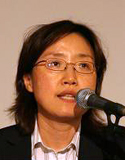 |
Cho
Ju Hyun
(Kyemyung University, Women's Studies) |
|
| |
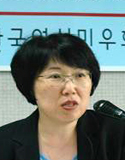 |
Huh
Raa Geum
(Ewha Woman's University, Women's Studies) |
|
| |
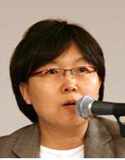 |
Myung
Jin Sook
(Member of the Policy Committee Korean WomenLink) |
|
| |
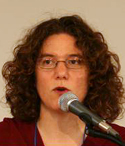 |
Emily
Galpern (Center for Genetics
and Society, USA)
Emily Galpern is the Project Director on Reproductive
Health and Human Rights for the Center for Genetics
and Society in Oakland, California, USA. She works
with US women's health and reproductive rights organizations
to raise their awareness about new genetic and reproductive
technologies, build their capacity to engage with
related issues, and promote policy that reflects
a commitment to women¡¯s health, reproductive rights,
health equity, human rights, and social justice.
Previously, she worked for 10 years promoting community
health and well-being through coalition-building,
advocacy, and health education. She obtained her
Master's in Public Health from San Francisco State
University in 2004. |
¡ß The
Center for Genetics and Society
The Center for Genetics and Society is a nonprofit
information and public affairs organization working
to encourage responsible uses and effective societal
governance of the new human genetic and reproductive
technologies. We work with a growing network of
scientists, health professionals, civil society
leaders, and others. The Center supports benign
and beneficent medical applications of the new human
genetic and reproductive technologies, and opposes
those applications that objectify and commodify
human life and threaten to divide human society.
The Center works in a context of support for the
equitable provision of health technologies domestically
and internationally; for women's health and reproductive
rights; for the protection of our children; for
the rights of the disabled; and for precaution in
the use of technologies that could alter the fundamental
processes of the natural world. |
|
| |
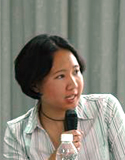 |
Elana
Hayasaka
(Our Bodies Ourselves, USA) |
|
¡ß Our
Bodies Ourselves (OBOS)
Our Bodies Ourselves (OBOS), also known as the Boston
Women¡¯s Health Book Collective (BWHBC), is a nonprofit,
public interest women¡¯s health education, advocacy,
and consulting organization. Beginning in 1970 with
the publication of the first edition of Our Bodies,
Ourselves and continuing for over 35 years, OBOS
has empowered women all over the world by providing
clear, truthful information about health, sexuality,
and reproduction. |
| |
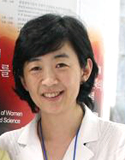 |
Paik
Young Gyung
(Member of the Policy Committee Korean WomenLink) |
|
| |
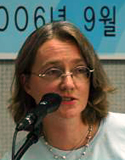 |
Sarah
Sexton (The Corner House,
UK)
"Sarah Sexton works with The Corner House,
a research and solidarity group based in the United
Kingdom. The group aims to support democratic and
community movements for environmental and social
justice. It tries to pay constant attention to issues
of social, economic and political power and practical
strategy. As part of its solidarity work, The Corner
House carries out analyses, research and advocacy
with the aim of linking issues, of stimulating informed
discussion and strategic thought on critical environmental
and social concerns, and of encouraging broad alliances
to tackle them. Sarah has worked with social, health,
women's and environment movements for some 20 years
in Europe and Asia. Sarah is the author of : "If
Cloning is the Answer, What was the Question? Power
and Decision-making in the Geneticisation of Health".
|
¡ß The
Corner House
Since its founding in 1997, The Corner House has
aimed to support democratic and community movements
for environmental and social justice. It is motivated
by the concerns of such movements, whether they
be locally-based struggles for land or water rights
or better health care; campaigns against destructive
mining, dam or forestry projects; or struggles against
racial discrimination. We aim to pay constant attention
to issues of social, economic and political power
and practical strategy. We try to take a "bottom-up"
approach, filled with examples, to issues of global
significance which are often handled in a more abstract
way. As part of our solidarity work, The Corner
House carries out analyses, research and advocacy
with the aim of linking issues, of stimulating informed
discussion and strategic thought on critical environmental
and social concerns, and of encouraging broad alliances
to tackle them. |
|
| |
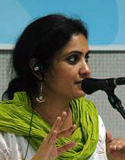 |
N.
B. Sarojini (SAMA : Resource Group for Women
and Health, INDIA)
N.B Sarojini is with SAMA-Resource Group for Women
and Health. Sarojini has been working as a health
activist in the field of women's health for the
last 15 years and is actively involved with the
women's movement. She has been actively campaigning
against two-child norm, population control policies,
sex
selective abortions and hazardous contraceptive
technologies. She was involved in Shodhini, a national-level
research network on traditional medicine and alternative
health system for women. She has been closely associated
with different progressive organisations and networks
such as the Medico Friend Circle and the People's
Health Movement and is currently coordinating the
study on Assisted Reproductive technologies and
their politics in the Indian context. |
¡ß Sama
: Resource Group for Women and Health
Sama was initiated by a group of women activists
who have been involved with women's empowerment
and health for several years. Sama's work on women
and health evolved in the context of the autonomous
women's movement, which views health from a broad
perspective and finds linkages of women's well being
not only with issues related to health, but locates
health within the larger socio-cultural and political
context. Equal emphasis is paid to issues of livelihood,
rights, violence ?(societal, familial, communal
and medical), food and other larger issues that
affect people's lives.
Sama has been an active part of the women's movement,
public health movement and ethics movement in the
country. Sama has been involved in campaigns and
advocacy initiatives with respect to injectable
contraceptives, implants, sex determination and
sex selective abortions. Sama is also now actively
involved
in research and policy advocacy on Assisted Reproductive
Technology.
Sama works closely with community-based organisations,
health networks, people's movements and women's
groups across the country primarily through training,
advocacy, action-research, material development
and dissemination. The aim of our organization is
to raise awareness regarding women issues, amongst
women and also the larger society. |
|
| |
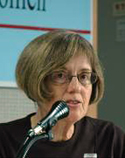 |
Diane
Beeson (HOOO, USA)
Diane Beeson is Professor Emerita of Sociology,
at California State University, East Bay. She received
her PhD from the University of California, San Francisco
(UCSF), specializing in medical sociology. She was
a Pew post-doctoral fellow at UCSF's Institute for
Health Policy Studies. Her main research interest
for nearly three decades has been the social challenges
of new reproductive technologies. For much of this
time she was affiliated with UC Berkeley's Institute
for the Study of Social Change, researching social
implications of genetic testing. In 1996 and 1997
she was a visiting scholar at Stanford University's
Center for Genomics, Ethics and Society.She has
served as a consultant on projects related to genetic
testing for numerous organizations, including the
National Society of Genetic Counselors, National
Institutes of Health, and the US Department of Energy.
She has served on peer review committees for the
National Human Genome Research Institute and has
authored numerous articles in professional journals
and anthologies. In 2004 she co-founded the ProChoice
Alliance Against California's Proposition 71 (Stem
Cell Research Initiative). She is also a founding
member of HandsOffOurOvaries. |
¡ß HandsOffOurOvaries
a project of Every Woman First, was founded March
8, 2006 on International Women's Day in response
to unprecedented demands for women's eggs.We are
concerned women and men from many walks of life
and countries who think it is time to raise our
voices for a biotechnology that does not exploit
women. We urge policy makers to put women at the
center of their concern by adopting a moratorium
on egg extraction for research purposes until such
time as global discourse and scientific research
yields information sufficient to establish adequate
informed consent. Information for this consent must
include independent assessments of the short and
long-term medical risks of egg harvesting including
the incidence and prevalence of ovarian hyperstimulation
syndrome (OHSS) and possible connections between
egg extraction procedures and reproductive cancers,
infertility, adverse birth outcomes and other iatrogenic
conditions. We support development of biotechnologies,
including many forms of stem cell research, that
promote the well-being of all people. |
|
| |
Chiaki
Hayashi (SOSHIREN, JAPAN)
My name is Chiaki Hayashi, 52 years old, living in Chiba
prefecture near metropolis. I am one of the 9 or 10 voluntary
core members of SOSHIREN. I am also a Ph.D. candidate
in Comparative Cultures (Comparative Gender Studies Programs)
at Josai International University Graduate School of Humanities.
¡ß SOSHIREN
SOSHIREN is the abbreviation for Women's Network against
the Eugenic Protection Law. The Eugenic Protection Law
was enacted in 1948 mainly in order to legalize induced
abortion while the Criminal Code had banned it in principle
since 1880. At the same time, as the title shows, the
law was to "prevent the birth of inferior offspring."In
1982, when the amendment bill was prepared to make induced
abortion practically constrained, SOSHIREN started as
an umbrella committee of several grassrootsgroups all
over Japan and consequently stopped the amendment. Since
then, our main concern has been always women's reproductive
rights and freedom.
In 1996, the Eugenic Protection Law was finally revised
and renamed the Maternal Protection Law (literally the
Mother's Body Protection Law) which deletes eugenic
clauses. We yet keep alert as far as the "aborticide"
clause in the Criminal Code remains.
We protest that women's bodies are treated as tools
for population control policy not only quantitative
but also qualitative. These years, we address opposing
opinions to the Government's councils on using women's
body tissue for researches of biotechnology.
SPSHIREN has no representative, nor full-time office
staff. The members are all the subscribers of monthly
newsletter, now around 200-circulation, most of whom
are activists of various civil movements including some
academics.
|
| |
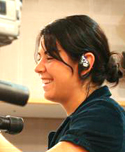 |
Lauren
Berliner (filmmaker, USA)
Lauren Berliner is a filmmaker and PhD student at
the University of California, San Diego, in the
department of Communication. Her documentary, All
in One Basket, explores the emotional and physical
risks to egg donors who donate for reproduction,
as it follows three women through their experiences
with the process. |
|
| |
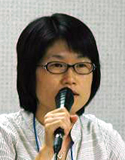 |
Son
Bong Hee
(Korean WomenLinK, Korea) |
|
| |
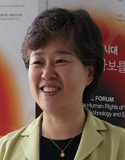 |
Yoo
Kyung Hee
(Korean WomenLink Standing Representative) |
|
| |
|
|













